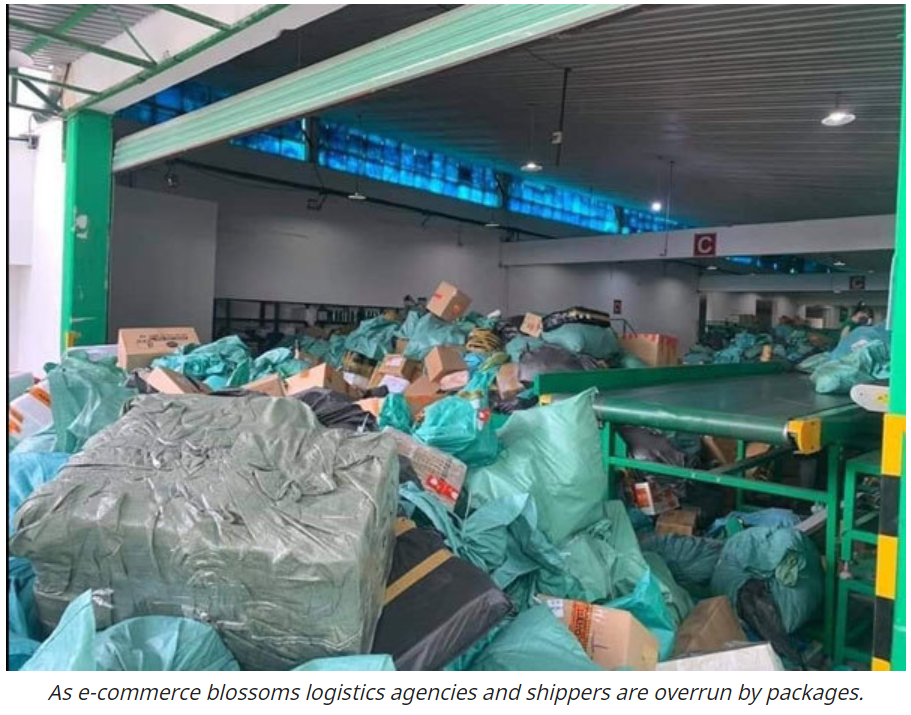Vietnam: Shippers and ride-hailers pushed to the limit amid pandemic
While people are staying at home to curb the spread of the pandemic, last-mile delivery shippers work hard to provide essentials and food to consumers.
However, shippers are becoming overwhelmed by rising orders and the high risk of coronavirus infection.
Vietnam’s e-commerce sector was growing even before the pandemic hit. Now, with lockdowns and social distancing making online retail more popular, it is predicted to record double-digit growth even after the passing of COVID-19.
According to Vietnam’s State of E-commerce report by YouGov, e-commerce outperforms traditional brick-and-mortar retail during the pandemic. Customers prefer to have goods delivered to their doorstep rather than going outside and risking infection. YouGov data shows that almost half of consumers (43 per cent) spent less in stores during previous waves of the outbreak, compared to around a third (36 per cent) who spent less online.
In particular, when big cities like Hanoi and Ho Chi Minh City adopted social distancing measures, e-commerce demand surged. In particular, Ho Chi Minh City has extended social distancing measures by another month, creating both opportunities and challenges for e-commerce players and last-mile delivery providers.
Specifically, e-commerce spending spiked during a pandemic when shops closed and people spent more time online at home. The fastest-growing segments were groceries and fresh food, with shippers receiving skyrocketing orders each day. However, they also have to face increased risks of infection while ensuring the critical supply of goods to online shoppers.
Hoang Ba Ngoc from Ho Chi Minh City lost his job during the fourth wave of the pandemic and decided to become a shipper. Each day he delivers dozens of orders across the city, with growing dread as community infections increase.
“While people stay at home to avoid the pandemic, shippers have to deliver orders and meet hundreds of people every day. We are afraid of the virus but we have little choice,” he said. “Day after day, we hear news of colleagues infected and struggle to follow 5K safety regulations while dealing with so many orders and consumers.”
In addition, shippers are beset by other challenges like the hot weather and the lack of shelter to take a rest between trips.
Pham Van Nam, a delivery worker from Hanoi, shared: “I regularly read about the COVID-19 pandemic in the press. After news of a colleague being diagnosed as F0, I was very anxious. I know this job is fraught with risks at the best of times and that it’s especially bad during the pandemic, but this is the only source of income for my family so I can’t quit now.”
Nguyen Manh Cuong, who lives and works in Ho Chi Minh City, said that since the COVID-19 outbreak, he has given up wet markets and supermarkets and instead shopped online. He and his family were very nervous to hear that a ride-hailing driver tested positive for coronavirus.
As shippers are constantly moving around the city to deliver goods to customers, an infection could set off outbreaks at various points of the city within a single day. Meeting so many people each they, shippers can easily contract the virus if they do not follow pandemic prevention protocols to the letter.
At the same time, last-mile delivery companies are also under tremendous pressure during the pandemic. Some companies fail to deliver large numbers of orders on time which leads to congested warehouses and additional expenses to compensate customers.
Meanwhile, complaints by shippers about overwork have been growing more serious as the workload increases. Some shippers and warehouse workers need rest due to burnout after working overtime amid the shopping boom.
Nguyen Thi Lan, a logistics staff at a delivery company said that the number of orders for processing have increased by about 40 per cent. She had to work overtime in the past month to keep up with work. With the rising number of packages, more mistakes than usual are inevitable but she continues to try her best to stay on top for the benefit of customers.
On the same note, Nguyen Van Thanh, a warehouse manager in Hanoi added, “There are hundreds of concerns for companies during the pandemic. Some shippers cancel orders when they can’t connect with consumers, which affects both delivery companies and the sellers. Meanwhile, there is a critical shortage of warehouse staff who are trained in sorting and classifying goods.”
Despite the challenges, a growing number of people are deciding to become ride-hailing drivers and shippers to make ends meet during the pandemic. Regardless of gender and age, these workers work day and night to meet the needs of customers. It is clear that shippers are an important point of connection between consumers and businesses and are essential in ensuring the supply of essentials and food during the pandemic.
Last-mile delivery companies need to prepare business plans to fit the pandemic situation in the coming time. They should strictly enforce pandemic prevention measures while also creating a better working environment for shippers.
Source: VIR


 English
English




